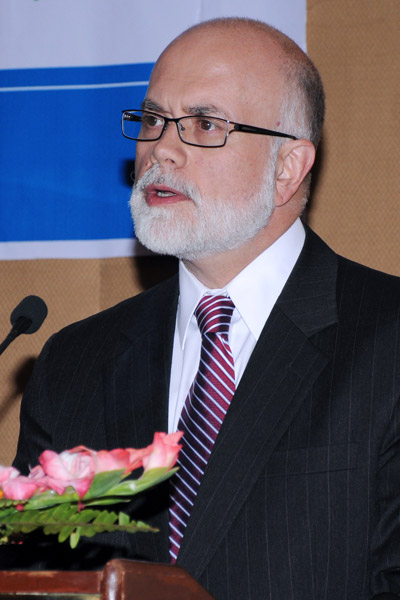The U.S. Institute of Peace has unveiled a pathbreaking survey of attitudes toward the police, justice and rule of law in politically troubled Nepal, an effort that could help guide reforms needed to tame the violence and corruption plaguing the Himalayan nation’s young democracy.
April 6, 2011
(Photos - Left: Minister of Education Ganga Lal Tuladhar, the official representative of the Government of Nepal, officially launches the report. Right: Ambassador Scott DeLisi.)
 The U.S. Institute of Peace has unveiled a pathbreaking survey of attitudes toward the police, justice and rule of law in politically troubled Nepal, an effort that could help guide reforms needed to tame the violence and corruption plaguing the Himalayan nation’s young democracy.
The U.S. Institute of Peace has unveiled a pathbreaking survey of attitudes toward the police, justice and rule of law in politically troubled Nepal, an effort that could help guide reforms needed to tame the violence and corruption plaguing the Himalayan nation’s young democracy.
The year-long survey, released in the capital of Kathmandu on March 25, marks a high point in USIP projects aimed at strengthening security and rule of law in the country, which is wedged between India and China. USIP programs in Nepal started in May 2006—a few months before the signing of a Comprehensive Peace Agreement ending ten years of armed conflict between the government and a Maoist-Communist movement that remains an important political party.
Though an interim democratic constitution and government are in place and high-intensity conflict is over, Nepal has been held back by political corruption, crime, communal tensions and insufficient resources to establish an effective justice system. The survey, “Calling for Security and Justice in Nepal: Citizens’ Perspectives on the Rule of Law and the Role of the Nepal Police,” reflects interviews with more than 12,000 Nepalis—an unprecedented effort to assess popular concerns along with those of key groups, such as the Nepal Police. The survey was a logistical challenge, with USIP staff training 101 surveyors, many of whom had to hike through mountains into remote villages, where they would set up camp and do their interviews.
The survey found that Nepalis cite “political pressure” above all as the reason the Nepal Police (NP) is unable to provide satisfactory security. A large majority favored a genuinely independent NP. The interview results cast a spotlight on a law enforcement and justice system that is shot through with political interference—from the actions of political parties, sitting officials, the police themselves and ordinary citizens who try to circumvent the normal system or rig the outcome of criminal proceedings. Political parties and affiliated groups were seen as bearing the greatest responsibility for what Nepalis consider the leading threats to security: “bandhs” (general strikes), “chakkajams” (roadblocks), corruption, vigilantism and political pressure. Adding to the complexity is the presence of sporadic political violence, organized crime and ordinary criminals—as well as ordinary citizens who resort to bribery and threats and tap their own political connections to get favorable action from the police and others. “People don’t have trust in the system and so they go to self-help,” explains Colette Rausch, a former Justice Department prosecutor who directs the Institute’s Rule of Law Center of Innovation.
That system, weak and routinely manipulated, is now blocking Nepal’s efforts to make a complete transition from conflict to peace and security. Says Rausch, “In Nepal, it is really a fundamental issue. It can prevent a lot of reform efforts from taking place.”
The USIP survey found numerous indications of basic dysfunction in the rule of law. Among respondents who said they were victimized by or witnessed a crime, one-third did not report it, believing that the NP could not or would not help. Two-fifths of those who did not report a crime sought out unofficial ways of settling the issue, such as through political parties or outside groups. More than half of ordinary Nepalis interviewed said the NP, not the courts, was the agency most responsible for deciding guilt or innocence.
At the same time, members of the police surveyed revealed deep dissatisfactions: three-fifths of NP personnel contacted reported witnessing instances of nepotism, favoritism and corruption. The study says of police: “Nearly one-third believe that they personally have been denied professional opportunities because they did not pay bribes or lacked family or friend connections.”
The Kathmandu launch of the survey drew some 250 people, including several senior government and police officials. Shobhakar Budhathoki, the national advisor to USIP in Nepal, laid out the frustrations detailed in the survey but also noted that Nepalis “feel safer overall” when the police are present and want it “to be the lead institution providing security.”
Ramesh Chand Thakuri, the inspector general of police, said the extensive data compiled would help guide future reforms. “It is our commitment to follow this report and correct our weakness,” he said. Nepal’s attorney general and minister of education were also keynote speakers at the event, which drew a variety of political figures, business people, police, lawyers, academics and leaders of nongovernmental groups. The report is expected to serve as a tool for international donor agencies operating in Nepal as well.
The State Department's Bureau of International Narcotics and Law Enforcement Affairs partially funded the survey. U.S. Ambassador Scott DeLisi credited USIP’s research and its “effort to support communication between Nepal Police, local government, political parties, civil society, and the local community.”
With Pauline Limbu in Kathmandu and Vijay Simhan in Washington.